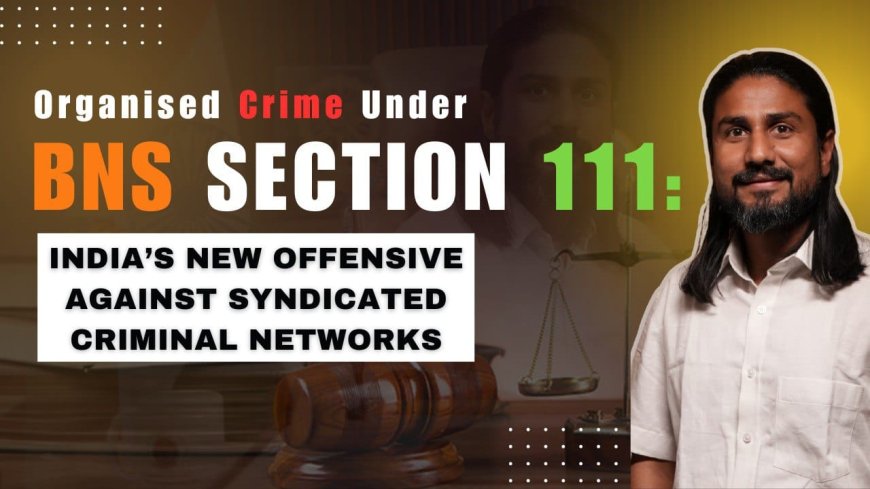Organised Crime Under BNS Section 111: India’s New Offensive Against Syndicated Criminal Networks

New Delhi, India — 08 sept 2025 With the introduction of the Bharatiya Nyaya Sanhita (BNS), 2023, India has taken a historic step in reshaping its criminal laws. One of the most significant additions is Section 111 – Organised Crime, which for the first time formally recognises organised criminal groups and their structured activities as a specific offence.
Renowned Cyber Expert and Senior Cyber Crime Investigator Vikash Kumar, President at ROOTxCon Foundation (regd.), CEO at M Cyber Academy, call this a “critical milestone in India’s legal fight against syndicates ranging from cyber gangs to financial fraud networks.”
What Counts as Organised Crime?
Under BNS Section 111, organised crime is no longer seen as isolated criminal acts but as coordinated, repeated offences by a group working together for unlawful gain. This includes:
Cybercrime Syndicates – Groups operating phishing, ransomware, and online financial scams.
Narcotics & Arms Trafficking – Cartel-driven supply chains.
Extortion & Terror Financing – Digital payments used for illegal funding.
Cross-Border Laundering – Mule accounts and crypto channels controlled by syndicates.
The Key Provisions
The BNS Section 111 on Organised Crime establishes:
Criminal Liability for Groups – Not just the individual, but the entire organised network can be prosecuted.
Enhanced Punishments – Stronger penalties, with imprisonment ranging from 5 years to life depending on severity.
Targeting Financial Backbones – Seizure of property, funds, and digital assets gained through organised crime.
Link to Digital Economy – Specific focus on cyber-enabled organised crime like deepfake frauds, AI-driven scams, and crypto laundering.
Why This Matters in Cybersecurity
According to Mr.Vikash Kumar, India’s new law has direct implications for cyber forensics and financial surveillance:
“Most cyber frauds today aren’t run by lone hackers—they’re industrialized operations with recruitment, training, and money laundering channels. Recognizing this under BNS Section III gives law enforcement the legal edge to dismantle entire networks, not just arrest scapegoats.”
Organised Crime & The Digital Shift
With 8.5 lakh mule accounts recently detected by the CBI, and cybercrime losses crossing ₹1,250 crore annually, the line between street crime and digital crime has blurred. Organised gangs exploit:
Dark Web Marketplaces
Social Engineering Call Centers
Crypto Exchanges without AML Compliance
Fake Job Portals for Money Mule Recruitment
The BNS’s new provisions now empower agencies to directly target these structures.
The Way Forward
To make BNS Section 111 impactful, experts recommend:
Special Cybercrime Units with forensic and AI-powered investigation tools.
Cross-Border Treaties for data sharing with global enforcement agencies.
Mass Awareness so that common citizens understand how not to become part of organised fraud chains.
Conclusion
The BNS’s recognition of Organised Crime as a distinct offence is more than a legal update — it is India’s acknowledgment of the digital, financial, and cross-border nature of today’s crime economy.
As Mr. Kumar puts it:
“This is not just about punishing criminals, but dismantling the entire infrastructure of organised syndicates — from the hacker in a call centre to the mastermind abroad. With Section 111, India has the legal armour, now it must act with speed and precision.
Disclaimer:
The views and opinions expressed in this article are solely those of the author. They do not necessarily reflect the views of the publication, the journalist, or any affiliated organization, and no responsibility is assumed for them.







